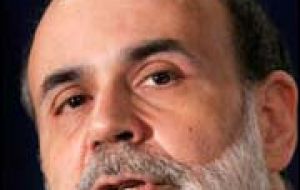MercoPress. South Atlantic News Agency
US Federal Reserve Bernanke says 2008 outlook worse
 Bernanke: 'substantive' rate cuts may be needed
Bernanke: 'substantive' rate cuts may be needed Federal Reserve chief Ben Bernanke has said that the outlook for the US economy in 2008 has worsened.
His comments in Washington come after leading investment banks warned that the US was heading for a recession. However, Mr Bernanke said the central bank was willing to act in a decisive and timely manner to ensure the economy remained on an even keel. Fresh interest rate cuts may be needed to shore up US economic growth amid a protracted housing slump and financial market turmoil, Federal Reserve chairman Ben Bernanke said Thursday. The central bank chief said the outlook for economic growth in 2008 had "worsened" because of the housing meltdown, rising oil prices and weakened stock markets. "In light of recent changes in the outlook for and the risks to growth, additional policy easing may be necessary," Bernanke said during a speech in Washington. "We stand ready to take substantive additional action as needed to support growth and to provide adequate insurance against downside risks," Bernanke said, adding that the Fed would remain "exceptionally alert and flexible." Economists said Bernanke's remarks suggested the central bank will slash interest rates by more than expected at a two-day policy meeting scheduled for January 29-30. Societe Generale economist Stephen Gallagher said Bernanke had raised "the odds for the larger 50-basis-point move", and that the Fed chairman's language indicated the central bank may not wait until the end of the month to cut rates. Most Fed-watchers expect the central bank to lower its key federal funds rate, currently at 4.25 percent, at its first meeting of the year. The Fed has trimmed borrowing costs by a full percentage point since September as concerns about the mortgage and credit markets have spiked. "Bernanke's comments indicate the Fed had done nothing to dissuade the market from an expected 50-basis-point rate cut later this month," said Marc Chandler, an analyst at Brown Brothers Harriman. Wall Street appeared cheered by Bernanke's stance, as the Dow Jones Industrial Average rallied almost one percent to a close of 12,853.09. The Dow has plummeted from a record high of 14,164.53 points in early October. "Financial markets had already raised the odds of a 50 basis point cut in the target federal funds rate to near 75 percent, and Bernanke's speech did not dissuade the markets from the view that this is the most likely outcome," said Brian Bethune, an economist with Global Insight. Economists at Goldman Sachs warned in a briefing note Wednesday that the world's biggest economy appears to be "falling into a recession." Bernanke said the Fed is not forecasting a recession at present, but does foresee slower growth. The central bank chief said the housing downturn had shaken the financial markets which he described as "fragile" and made big banks more cautious about lending. Such strains would continue to pose economic risks, he said. Bernanke also said the housing market's woes and "the subprime crisis," home loans granted to Americans with poor credit, had heavily dented the earnings of some major banks, but stressed the "banking system remains sound." He argued that the Fed's new system of credit auctions, which have helped boost liquidity in the financial market, had eased a widespread credit crunch. The latest survey on the job market revealed slower employment growth and this could affect consumer spending, especially if companies cut back on hiring. Consumer spending is a critical economic motor accounting for some two-thirds of gross domestic product (GDP). Bernanke said recent economic news suggested "the downside risks to growth have become more pronounced." "The demand for housing seems to have weakened further, in part reflecting the ongoing problems in mortgage markets. In addition, a number of factors, including higher oil prices, lower equity prices, and softening home values, seem likely to weigh on consumer spending as we move into 2008," he cautioned. Some economists believe the central bank will have to cut rates as low as 2.50 percent by the end of 2008 to keep the economy ticking along.




Top Comments
Disclaimer & comment rulesCommenting for this story is now closed.
If you have a Facebook account, become a fan and comment on our Facebook Page!